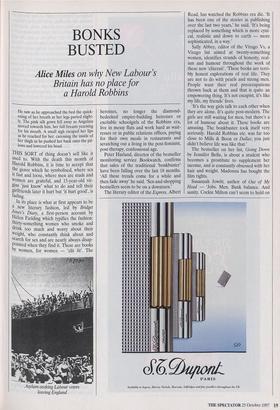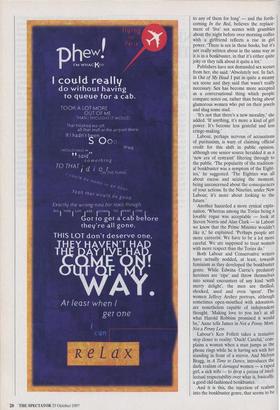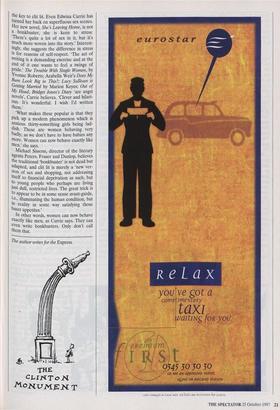BONKS BUSTED
Alice Miles on why New Labour's
Britain has no place for a Harold Robbins
He saw as he approached the bed the quick- ening of her breath as her legs parted slight- ly. The pink silk gown fell away as Angelina moved towards him, her full breasts yearning for his mouth. A small sigh escaped her lips as he reached for her, caressing the inside of her thigh as he pushed her back onto the pil- lows and lowered his head.. ..
THIS SORT of thing doesn't sell like it used to. With the death this month of Harold Robbins, it is time to accept that the genre which he symbolised, where sex is fast and loose, where men are studs and women are grateful, and 15-year-old vir- gins 'just know' what to do and tell their girlfriends later it hurt but 'it hurt good', is fading.
In its place is what at first appears to be a new literary fashion, led by Bridget Jones's Diary, a first-person account by Helen Fielding which typifies the fashion: thirty-something women who smoke and drink too much and worry about their weight, who constantly think about and search for sex and are nearly always disap- pointed when they find it. These are books by women, for women — 'clit lit'. The
Asylum-seeking Labour voters leaving England
heroines, no longer the diamond- bedecked empire-building heiresses or excitable schoolgirls of the Robbins era, live in messy flats and work hard as wait- resses or in public relations offices, paying for their own meals in restaurants and scratching out a living in the post-feminist, post-therapy, confessional age. Peter Harland, director of the bestseller monitoring service Bookwatch, confirms that sales of the traditional tonkbuster' have been falling over the last 18 months. `All these trends come for a while and then fade away' he said. 'Sex-and-shopping bestsellers seem to be on a downturn.'
The literary editor of the Express, Albert Read, has watched the Robbins era die. 'It has been one of the stories in publishing over the last two years,' he said. 'It's being replaced by something which is more cyni- cal, realistic and down to earth — more sophisticated, in a way.'
Sally Abbey, editor of the Virago Vs, a Virago list aimed at twenty-something women, identifies strands of honesty, real- ism and humour throughout the work of these new 'cliterati'. 'These books are terri- bly honest explorations of real life. They are not to do with pearls and strong men. People want their real preoccupations thrown back at them and that is quite an empowering thing. It's not escapist, it's like my life, my friends' lives.
`It's the way girls talk to each other when they are alone. It's quite post-modern. The girls are still waiting for men, but there's a lot of humour about it. These books are amusing. The bonkbuster took itself very seriously. Harold Robbins etc. was far too close to Mills & Boon or Dallas; you just didn't believe life was like that.'
The bestseller on her list, Going Down by Jennifer Belle, is about a student who becomes a prostitute to supplement her income, and is constantly obsessed with her hair and weight. Madonna has bought the film rights.
Susannah Jowitt, author of Out of My Head — 'Jobs. Men. Bank balance. And sanity. Cockie Milton can't seem to hold on to any of them for long' — and the forth- coming In the Red, believes the replace- ment of 'live' sex scenes with grumbles about the night before over morning coffee with a girlfriend reflects a rise in girl power. 'There is sex in these books, but it's not really written about in the same way as it is in a bonkbuster, in that it's either quite joky or they talk about it quite a lot.'
Publishers have not demanded sex scenes from her, she said: 'Absolutely not. In fact, in Out of My Head I put in quite a steamy sex scene and they said that wasn't really necessary. Sex has become more accepted as a conversational thing which people compare notes on, rather than being about glamorous women who put on their jewels and shag some stud.
`It's not that there's a new morality,' she added. 'If anything, it's more a kind of girl power. It's become less grateful and less cringe-making.'
Labour, perhaps nervous of accusations of puritanism, is wary of claiming official credit for this shift in public opinion, although one senior source heralded it as a `new era of restraint' filtering through to the public. 'The popularity of the tradition- al bonkbuster was a symptom of the Eight- ies,' he suggested. 'The Eighties was all about excess and seizing the moment, being unconcerned about the consequences of your actions. In the Nineties, under New Labour, it's more about looking to the future.'
Another hazarded a more cynical expla- nation. 'Whereas among the Tories being a lovable rogue was acceptable — look at Steven Norris and Alan Clark — in Labour we know that the Prime Minister wouldn't like it,' he explained. 'Perhaps people are more careerist. We have to be a lot more careful. We are supposed to treat women with more respect than the Tories do.'
Both Labour and Conservative writers have actually nodded, at least, towards feminism as they developed the bonkbuster genre. While Edwina Currie's predatory heroines are 'ripe' and throw themselves into sexual encounters of any kind 'with merry delight', the men are thrilled, shocked, used and even 'spent'. The women Jeffrey Archer portrays, although sometimes open-mouthed with adoration, are nonetheless capable of independent thought. 'Making love to you isn't at all what Harold Robbins promised it would be,' Anne tells James in Not a Penny More, Not a Penny Less.
Labour's Ken Follett takes a tentative step closer to reality: 'Ouch! Careful,' com- plains a woman when a man jumps as the phone rings while he is having sex with her standing in front of a mirror. And Melvyn Bragg, in A Time to Dance, introduces the dark realism of damaged women — a raped girl, a sick wife — to drop a patina of intel- lectual respectability over what is, basically, a good old-fashioned bonkbuster.
And it is this, the injection of realism into the bonkbuster genre, that seems to be the key to clit lit. Even Edwina Currie has turned her back on superfluous sex scenes. Her new novel, She's Leaving Home, is not a bonkbuster, she is keen to stress: There's quite a lot of sex in it, but it's much more woven into the story.' Interest- ingly, she suggests the difference in stress Is for reasons of self-respect. 'The act of writing is a demanding exercise and at the end of it one wants to feel a twinge of pride.' The Trouble With Single Women, by Yvonne Roberts; Arabella Weir's Does My Bum Look Big in This?; Lucy Sullivan is Getting Married by Marion Keyes; Out of My Head; Bridget Jones's Diary 'are angst novels', Currie believes. 'Clever and hilari- ous. It's wonderful. I wish I'd written them.'
:What makes these popular is that they pick up a modern phenomenon which is anxious thirty-something girls being lad- dish. These are women behaving very badly, as we don't have to have babies any more Women can now behave exactly like men,' she says. Michael Sissons, director of the literary agents Peters, Fraser and Dunlop, believes the traditional `bonkbuster' is not dead but adapted, and clit lit is merely a 'new ver- sion of sex and shopping, not addressing itself to financial deprivation as such, but to young people who perhaps are living Just dull, restricted lives. The great trick is to appear to be in some sense avant-garde, i.e., illuminating the human condition, but in reality in some way satisfying those baser appetites.' In other words, women can now behave exactly like men, as Currie says. They can even write bonkbusters. Only don't call them that.
The author writes for the Express.




















































































 Previous page
Previous page